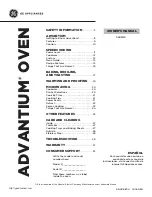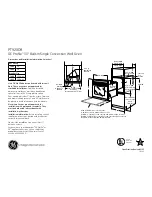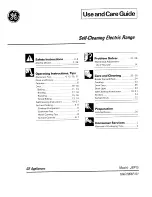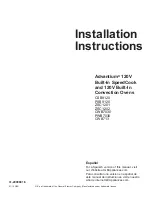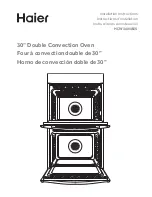
Page 23
3BE390954NU – 07/15
BONNET GRANDE CUISINE
Registered office:
Rue des Frères Lumière - Z.I Mitry Compans
F-77292 MITRY MORY Cedex
Cleaning product applied when the temperature is too high
All cleaning products are more aggressive at higher temperature. In principle the temperature of any surface
must not exceed 60°C or permanent staining (blackening) of the stainless steel will result.
Inadequate rinsing after cleaning
After cleaning the surfaces should all be rinsed thoroughly to remove any chemical residues. If this is not done
the residue will continue to act over time with the risk of starting the corrosive process.
Worse still, if the affected surface is submitted to temperatures over 60°C (inside of an oven, a tank or tank,...),
the impact will be greater and corrosion will almost inevitably occur.
Stagnation of cleaning products
In the same way, all the areas that can trap chemicals, especially the channels, gutters, drainage manifolds,
traps etc. must be subject to careful and plentiful rinsing. (Use a nylon brush to reinforce the action of rinsing with
clean water).
Salt concentration
Salt, much in use in kitchens, is often found to be the origin of pitting that can even penetrate the stainless
steel. Spillages on any surface should be cleaned up at once.
Particular case of cooking in boiling salted water:
Salting water in a tank or tank presents a major risk: never put cooking salt into the tank before the water and
remember that salt can concentrating on the base of the tank. Salt should be added to the water and stirred until it
dissolves, the risk is reduced using table salt which dissolves faster.
Intensive use with brine
Certain products, such as sauerkraut (acid juices), fish and sea food (presence of salt), and in general, all
brines, must be subject to particular attention. In the case of occasional use there should be no problem if equipment
is carefully and systematically cleaned after each use.
In the case of intensive use, all the cooking equipment (ovens, boiling pans, even utensils) must be selected
with a grade of stainless steel specifically adapted to use in such an environment
Too much chlorine in the mains water supply
Sometimes certain networks supply water containing chlorine at above normal levels. In this event it is not
unusual to be faced with problems of corrosion, pay particular attention to bain-marie, water baths, and equipment
left to soak overnight etc.
Cleaning aluminium or aluminium coated items
The presence of aluminium or items that are aluminium coated in a chlorine solution is a particularly powerful
catalyst for damaging stainless steel.
Do not leave fittings such as hood filters, aluminium trays or dishes soaking in tanks, tanks, pots, fryers etc.
Just one night is sufficient to etch stainless steel at the point of contact with aluminium.






















